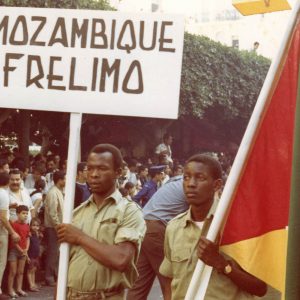New Books | Essays on Decolonisation
Achille Mbembe investigates the complexities of decolonisation, arguing in this essay that Africa is the best laboratory to gauge the limits of our theories of knowledge.
Author:
7 June 2021

This is a lightly edited excerpt from Out of The Dark Night: Essays on Decolonisation (Wits University Press, 2021) by Achille Mbembe.
Planetary entanglement
Writing about Africa in 1830-1831, this is what Hegel had to say: “The peculiarly African character is difficult to comprehend, for the very reason that in reference to it, we must quite give up the principle which naturally accompanies all our ideas – the category of universality. In Negro life, the characteristic point is the fact that consciousness has not yet attained to the realisation of any substantial objective existence –as for example, God, or law – in which the interest of man’s volition is involved and in which he realises his own being … The Negro … exhibits the natural man in his completely wild and untamed state. We must lay aside all thought of reverence and morality – all that we call feeling – if we would rightly comprehend him. There is nothing harmonious with humanity to be found in this type of character.”
Hegel then went on promising himself not to mention Africa again, for “it is no historical part of the world; it has no movement or development to exhibit”. What we properly understand by Africa, he concluded, “is the unhistorical, undeveloped spirit, still involved in the conditions of mere nature”.
Hegelian mythology
More than a century after Hegel’s verdict, Robert Kaplan authored a portrayal of that same continent in the February 1994 issue of the US-based Atlantic Monthly. The Cold War had just ended and most of the Western world was triumphantly riding on the crest of a wave of optimism. Celebrating this triumph – that of the West and of what he called the Western idea – Francis Fukuyama suggested in 1989 that “what we may be witnessing is not just the end of the Cold War, or the passing of a particular period of postwar history, but the end of history as such”.
By “the end of history as such”, he did not simply mean the end point of humankind’s ideological evolution. More fundamentally, he meant the reconciliation of the market principle and the idea of freedom, and “the universalisation of Western liberal democracy as the final form of human government”.
Related article:
Yet, projecting himself to the day and times after history had ended, he could only see melancholia and sadness, a profound nostalgia for the Hegelian world: “The end of history will be a very sad time. The struggle for recognition, the willingness to risk one’s life for a purely abstract goal, the worldwide ideological struggle that called forth daring, courage, imagination and idealism, will be replaced by economic calculation, the endless solving of technical problems, environmental concerns and the satisfaction of sophisticated consumer demands. In the post-historical period there will be neither art nor philosophy, just the perpetual caretaking of the museum of human history.”
As Fukuyama wrote his epitaph to history, Africa was in the midst of a spectacular collision. While apartheid and white minority rule were coming to a formal end in South Africa, a genocide of cataclysmic proportions was unfolding in Rwanda. The apotheosis of long years of struggle on the one hand, self-destruction on the other. Declining per capita incomes and production, low levels of savings and investment, slow growth in agricultural production, failing export earnings, strangled imports and unserviceable foreign debt burdens – all plagued most of sub-Saharan Africa.
In his scenario for the 21st century, Kaplan argued that West Africa in particular was becoming “the symbol of worldwide demographic, environmental and societal stress, in which criminal anarchy emerges as the real ‘strategic’ danger. Disease, overpopulation, unprovoked crime, scarcity of resources, refugee migrations, the increasing erosion of nation-states and international borders, and the empowerment of private armies, security firms and international drug cartels are now most tellingly demonstrated through a West African prism.”
Related article:
In Kaplan’s political geography – just as in Hegel’s a century earlier – “West Africa” became the epitome of those regions of the world where central governments were withering away, tribal and regional fiefdoms were on the rise and war had turned pervasive. West Africa, he argued, “is reverting to the Africa of the Victorian Atlas. It consists now of a series of coastal trading posts … and an interior that, owing to violence, volatility and disease, is again becoming … ‘blank’ and ‘unexplored’. It is Thomas Malthus, the philosopher of demographic doomsday, who is now the prophet of West Africa’s future. And West Africa’s future, eventually, will also be that of most of the rest of the world … in an age of cultural and racial clash.”
This apocalyptic view of Africa’s future was echoed in 2000 when, building upon Hegelian tropes once again, the influential financial weekly the Economist declared that Africa was a “hopeless continent”. In a famous editorial, it conjured up images of destitution, failure and despair, floods and famine, poverty and pestilence, brutality, despotism and corruption, dreadful wars and plunder, rape, cannibalism, amputation, and even the weather to suggest that Africa’s future was definitely doomed.
Foreign aid workers, peacekeeping missions, humanitarian agencies, and the world at large could well give up, so deeply “buried in their cultures” were the reasons for so much human misery, it concluded.
As the 21st century unfolds, it is gradually seeping into the minds of many that to a large extent our planet’s destiny might be played out in Africa. From a philosophical and cultural point of view, this planetary turn of the African predicament takes us far away from the Hegelian myths, which, for too long, have colonised Africa’s imagination of the world and the world’s imagination of Africa.
Related article:
On the continent itself, older senses of time and space and notions of history based on linear approaches to development and progress are gradually being replaced by newer senses of futures founded on open narrative models. There are many who increasingly believe that, through self-organisation and small ruptures, we can actually create myriad “tipping points” that may lead to deep alterations in the direction that both the continent and the planet take.
Yet to write the world from Africa, or to write Africa into the world or as a fragment thereof, is an exhilarating and, most of the time, perplexing task. As a name and as a sign, Africa has always occupied a paradoxical position in modern formations of knowledge.
On the one hand, the region has provided most of our modern disciplines with some of their foundational categories. From anthropology to political economy, from poststructuralism to psychoanalysis and postcolonial theory, the continent has been the purveyor of some of the most compelling concepts, without which modern criticism would be utterly poor.
Denationalisation
On the other hand, it has been largely assumed that “things African” are residual entities, the study of which does not contribute anything to knowledge of the world or of the human condition in general. Predicated on a narrow definition of what “Africa” stands for in the history of human thought, this assumption has in turn led to too restricted a conception of what knowledge is all about and whom it is supposed to serve. Today, the overwhelming belief is that, coupled with science and technology, market capitalism and “humanitarian” interventions will sort out most of the continent’s problems.
Complex social structures and processes such as war, mass poverty, joblessness, disease and illiteracy are treated as if all of these are purely technical matters and the human subjects implicated in these dramas have no histories. History itself has been reified in a set of abstractions, and the sense of being at the edge of a future so palpable in the immediate aftermath of colonialism and apartheid has quickly vanished.
As radical changes have unfolded, each requiring ever more complex modes of explanation and understanding, ignorance has been harnessed as a resource, enabling knowledge to be deflected, obscured or concealed in a way that has increased the scope of what remains unintelligible. Throughout the 20th century, the region has witnessed a surge in problem-oriented research that has become attractive to governments and private funding agencies because of its putative relevance to “real-world” challenges.
Related article:
Funding scarcity, in turn, has led numerous scholars to work as non-governmental organisation entrepreneurs and consultants, to stockpile short-term research contracts and to shift rapidly from one topic to another, a practice that increases the atomisation of knowledge rather than the thorough understanding of entire fields.
The research-for-hire financed by philanthropic organisations and development agencies favours the collection of large data sets. It privileges the production of quantitative indicators over critical analyses. Buttressed by an explicit and at times unqualified commitment to instrumentalism and social empiricism, it mainly treats Africa as a crisis-prone entity. The crisis itself is understood simply in technicist terms as an event that calls for a technical decision.
Needless to say, this kind of research has not resulted in as big of an improvement in knowledge as might have been expected. Nor has it made any space for theorisation. Nowhere have we witnessed the kind of cultural ferment and intellectual innovation that would have allowed scholars, critics and artists to cut across the customary boundaries separating philosophy, history, aesthetic criticism, political theory and theology, not to mention science and technology, or even metaphysics.
Yet, as the new century unfolds, many increasingly acknowledge that there is no better laboratory than Africa to gauge the limits of our epistemological imagination or to pose new questions about how we know what we know and what that knowledge is grounded in. Recent ethnographic studies of the region have shown how to draw on multiple models of time so as to avoid one-way explanatory shortcuts, how to open a space for broader comparative undertakings, and how to account for the multiplicity of the pathways and trajectories of change.
In fact, there is no better terrain than Africa for a scholarship that is keen to describe novelty and originality, multiplicity, singularity and complexity, and is mindful of the fact that the ways in which societies compose and invent themselves in the present – what we could call the creativity of practice – are always ahead of any knowledge we can ever produce about them.
Related article:
In their book Theory from the South, Jean and John Comaroff have amply demonstrated that the challenges to critical social theory are nowhere as acute as they are in the Southern Hemisphere, perhaps the epicentre of contemporary global transformations – in any case the site of unfolding developments that are contradictory, uneven, contested and for the most part undocumented. Here, fundamental problems of poverty and livelihood, equity and justice are still, for the most part, unresolved.
A huge amount of labour is still put into eliminating want, repairing that which has been broken, making life possible or simply maintaining it. People marginalised by the development process live under conditions of restlessness, uncertainty and great personal risk. They permanently confront a threatening environment in conditions of virtual or functional superfluousness. In order to survive, many are willing to gamble with their lives and with those of other people.
This is a deeply heterogeneous world of flows, fractures and frictions, accidents and collisions. Power relations and the antagonisms that shape late, deregulated capitalism are redefined here in ways and forms not seen at earlier historical periods. Contemporary forms of life, work, property, production, exchange, languages and value testify to an openness of the social that earlier descriptive and interpretive models can no longer account for.
Related article:
New boundaries are emerging, while old ones are being redrawn, extended or simply abandoned. The paradoxes of mobility and closure, of entanglement and separation, of continuities and discontinuities between the inside and the outside, the local and the global, or of temporariness and permanence pose new challenges to critical thought and intellectual inquiry.
These processes have coincided with the redrawing of the global intellectual map – a shift that started during the era of decolonisation. Besides traditional northern Atlantic research institutions and centres of learning, alternative circuits of circulation (South/South, North/East, South/East) have emerged during the last quarter of the 20th century.
This worldwide dissemination of thought has been buttressed by a worldwide circulation and translation of texts, a highly productive invention and reappropriation of concepts, and the denationalisation of the great academic debates. Whether the denationalisation of the humanities and academic discussion has brought a truly global perspective to conventional Western theory and criticism remains to be seen.
At the very least, it is now recognised that the world can be studied from everywhere and anywhere. Major transformations in the way in which we think about the histories of the world are underway. In this context, any inquiry into the place of Africa – and by extension the global South – in theory is necessarily an interrogation concerning the experience of the world in an epoch when “the planet is no longer as large as it once was”.






